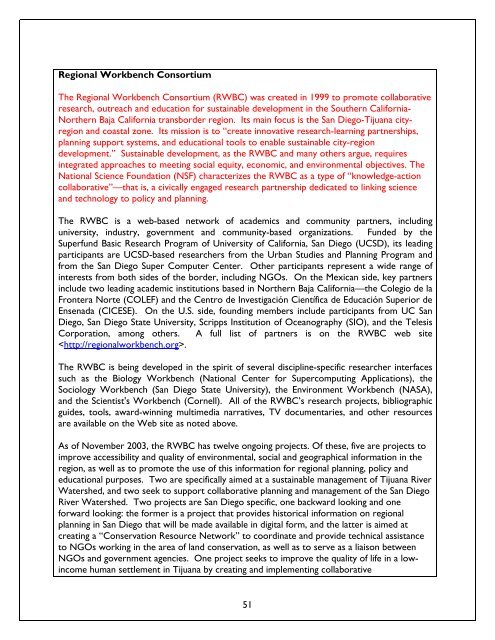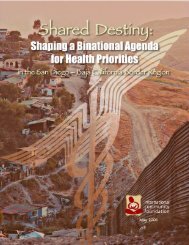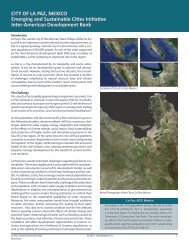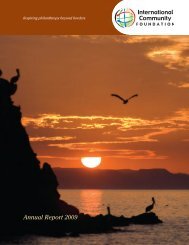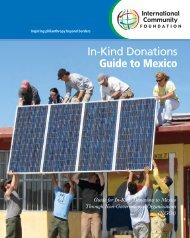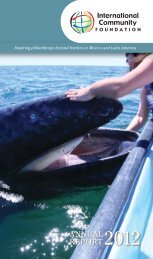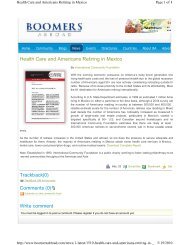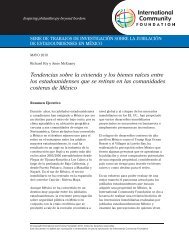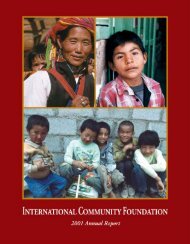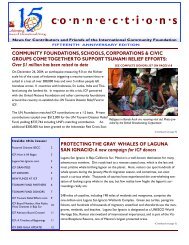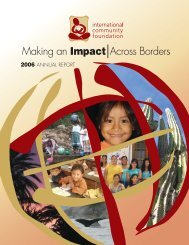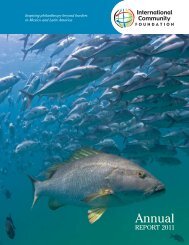Blurred Borders - International Community Foundation
Blurred Borders - International Community Foundation
Blurred Borders - International Community Foundation
Create successful ePaper yourself
Turn your PDF publications into a flip-book with our unique Google optimized e-Paper software.
Regional Workbench Consortium<br />
The Regional Workbench Consortium (RWBC) was created in 1999 to promote collaborative<br />
research, outreach and education for sustainable development in the Southern California-<br />
Northern Baja California transborder region. Its main focus is the San Diego-Tijuana cityregion<br />
and coastal zone. Its mission is to “create innovative research-learning partnerships,<br />
planning support systems, and educational tools to enable sustainable city-region<br />
development.” Sustainable development, as the RWBC and many others argue, requires<br />
integrated approaches to meeting social equity, economic, and environmental objectives. The<br />
National Science <strong>Foundation</strong> (NSF) characterizes the RWBC as a type of “knowledge-action<br />
collaborative”—that is, a civically engaged research partnership dedicated to linking science<br />
and technology to policy and planning.<br />
The RWBC is a web-based network of academics and community partners, including<br />
university, industry, government and community-based organizations. Funded by the<br />
Superfund Basic Research Program of University of California, San Diego (UCSD), its leading<br />
participants are UCSD-based researchers from the Urban Studies and Planning Program and<br />
from the San Diego Super Computer Center. Other participants represent a wide range of<br />
interests from both sides of the border, including NGOs. On the Mexican side, key partners<br />
include two leading academic institutions based in Northern Baja California—the Colegio de la<br />
Frontera Norte (COLEF) and the Centro de Investigación Científica de Educación Superior de<br />
Ensenada (CICESE). On the U.S. side, founding members include participants from UC San<br />
Diego, San Diego State University, Scripps Institution of Oceanography (SIO), and the Telesis<br />
Corporation, among others. A full list of partners is on the RWBC web site<br />
.<br />
The RWBC is being developed in the spirit of several discipline-specific researcher interfaces<br />
such as the Biology Workbench (National Center for Supercomputing Applications), the<br />
Sociology Workbench (San Diego State University), the Environment Workbench (NASA),<br />
and the Scientist's Workbench (Cornell). All of the RWBC’s research projects, bibliographic<br />
guides, tools, award-winning multimedia narratives, TV documentaries, and other resources<br />
are available on the Web site as noted above.<br />
As of November 2003, the RWBC has twelve ongoing projects. Of these, five are projects to<br />
improve accessibility and quality of environmental, social and geographical information in the<br />
region, as well as to promote the use of this information for regional planning, policy and<br />
educational purposes. Two are specifically aimed at a sustainable management of Tijuana River<br />
Watershed, and two seek to support collaborative planning and management of the San Diego<br />
River Watershed. Two projects are San Diego specific, one backward looking and one<br />
forward looking: the former is a project that provides historical information on regional<br />
planning in San Diego that will be made available in digital form, and the latter is aimed at<br />
creating a “Conservation Resource Network” to coordinate and provide technical assistance<br />
to NGOs working in the area of land conservation, as well as to serve as a liaison between<br />
NGOs and government agencies. One project seeks to improve the quality of life in a lowincome<br />
human settlement in Tijuana by creating and implementing collaborative<br />
51


